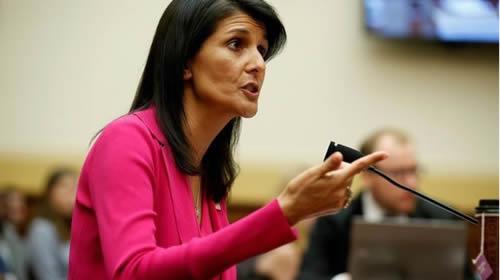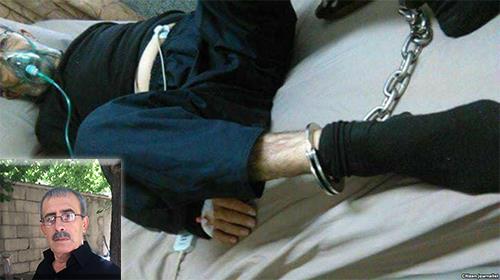U.S. asks if Iran military sites to be checked under nuclear deal
FILE PHOTO, U.S. Ambassador to the United Nations Nikki Haley testifies to the House Foreign Affairs Committee on Advancing U.S. Interests at the United Nations in Washington, U.S., June 28, 2017.
UNITED NATIONS, Reuters, 22 August 2017 - The United States wants to know if the United Nations atomic watchdog plans to inspect Iranian military sites to verify Tehran's compliance with a 2015 nuclear deal, the U.S. ambassador to the United Nations, Nikki Haley, said on Tuesday.
Haley will meet with International Atomic Energy Agency (IAEA) officials in Vienna on Wednesday for what she described as a fact-finding mission, which is part of President Donald Trump's review of the deal Iran made with world powers to curb its nuclear program in return for the lifting of most sanctions.
'If you look ... at past Iranian behavior, what you've seen is there have been covert actions at military sites, at universities, things like that,' Haley, a member of Trump's cabinet, told Reuters in an interview.
'There were already issues in those locations, so are they including that in what they look at to make sure that those issues no longer remain?' she said. 'They have the authority to look at military sites now. They have the authority to look at any suspicious sites now, it's just are they doing it?'
She said she was traveling to Vienna to ask questions, not to push the IAEA to do anything.
Iran's top authorities have flatly rejected giving international inspectors access to their military sites, and Iranian officials have told Reuters that any such move would trigger harsh consequences.
'Why would they say that if they had nothing to hide? Why wouldn't they let the IAEA go there?' Haley said.
Iran's atomic chief was quoted by state media as saying on Tuesday that Iran could resume production of highly enriched uranium within five days if the nuclear deal was revoked.
In April, Trump ordered a review of whether a suspension of sanctions on Iran related to the nuclear deal - negotiated by President Barack Obama - was in the U.S. national security interest. He has called it 'the worst deal ever negotiated.'
Iranian President Hassan Rouhani warned last week that Iran could abandon the nuclear agreement 'within hours' if the United States imposes any more new sanctions.
Most U.N. and Western sanctions were lifted 18 months ago under the nuclear deal. Iran is still subject to a U.N. arms embargo and other restrictions, which are not technically part of the deal.
The IAEA policies restrictions the deal placed on Iran's nuclear activities and reports quarterly.
Haley said some of the questions she had were: 'Are you looking at everything? Are you looking for those places where there has been covert activity in the past? Are you able to get access to these areas? Or are you being delayed? Are you being shut out from those things?'
Under U.S. law, the State Department must notify Congress every 90 days of Iran's compliance with the nuclear deal. The next deadline is October, and Trump has said he thinks by then the United States will declare Iran to be noncompliant.
'We don't know if he's going to certify or decertify the deal,' said Haley, adding that she would report back to Trump and the national security team.
The U.S. review of its policy toward Iran is also looking at Tehran's behavior in the Middle East, which Washington has said undermines U.S. interests in Syria, Iraq, Yemen, and Lebanon.




Comments
Post a Comment